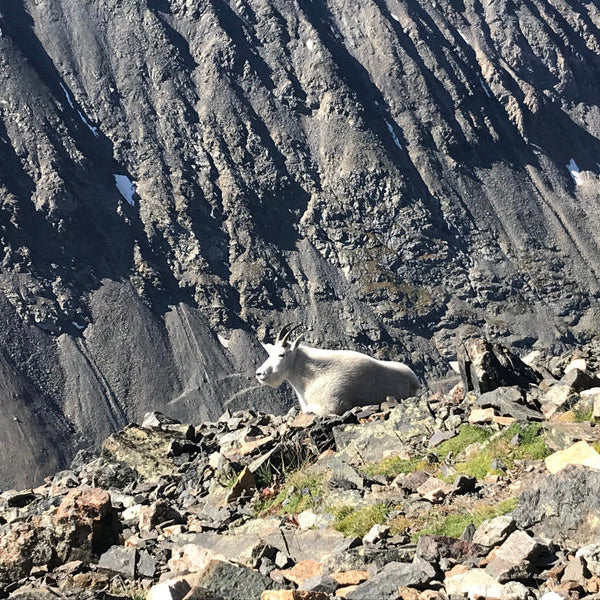
Just Because You Can, Doesn’t Mean You Should
Share
One summer there was a flock of sheep grazing peacefully in a valley surrounded by mountains, rolling hills, and a forest of tall trees. The valley was full of tall grass, wildflowers, and a stream of clear, cold water. The sheep were grateful to their shepherd for leading them to this valley and they were grateful to the dogs that lived among them and protected them from predators.
In the nearby mountain lived a small herd of wild mountain goats. The goats would look down upon the sheep living easily in the valley, protected by the dogs, but they never joined them. The sheep seemed to live an idyllic life, while the mountain goats had to struggle to live in the harsh mountains, searching for food and water, always wary of predators.
The flock of sheep seemed so peaceful without having to worry about where they should go and who would be the leader. Occasionally there were fights among the young mountain goats to decide who would be the leader of the herd.
One day a young mountain goat decided to leave the mountains and join the flock of sheep. As he approached the flock, the sheep were welcoming. “Join us,” they all said. “Why are you struggling to survive in the mountains when you could live here with us in the valley, protected by the dogs and led by the shepherd?”
So, the mountain goat joined the flock, encouraged by the welcoming reassurance that being part of the flock was better than living amongst the mountain goat herd.
After a few days, the mountain goat asked the sheep, “How long will we stay in this same valley?” The sheep responded that they would only leave when the shepherd decided. The goat was concerned because the grasses and flowers were being completely consumed. The sheep were not roaming the great distances he was used to which allowed the sparse grasses and flowers of the mountains to regrow. As the sheep continued to graze and live in the valley, the grasses and flowers were completely eaten, including the roots and seeds that would replenish the valley. The water in the stream became muddy and the entire valley began to suffer.
Again, the goat asked the sheep, “When will we move on? The valley is suffering.” The sheep responded as before, “We only move when the shepherd tells us to move. Why are you concerned with the valley? The shepherd has told us the valley does not belong to anyone; it is here for our use. We have the right to use this valley, eat the grasses and flowers, and drink the water.”
At this point the dogs heard the goat questioning the sheep, and the dogs growled at the goat saying, “If you are to live among the sheep and be protected by us and led by the shepherd, you cannot ask these questions. We have the right to do as we wish in the valley and we are not concerned with what happens when we leave.”
The goat became aware that the dogs were not only among the sheep to protect them from predators, but the dogs also prevented the sheep from leaving the flock. The sheep did not have the freedom the goat had when he was living in the mountains. It had been harder living in the mountains with his herd, but he had more freedom of thought and the herd was careful not to destroy the natural resources.
Do you live your life based on the doctrine of “I have the right, so I should,” or do you live a more thoughtful life by considering how your actions affect others?
What does it really mean to have the “right” to do something and who decides what our “rights” are within our societal group? Are we given greater rights if we share the same gender, ethnicity, level of education, economic class, and ideas as those who determine our rights?
Many would argue that there are inalienable rights and legal rights. Our inalienable rights are generally argued as our natural, human rights which are universal to all and not specific to any society. The most common is the right to life, but even that can be taken away. Our legal rights are determined by our local society and are generally accepted as the rules which govern our common society. These legal rights vary widely among different cultures.
In this story with whom do you most align? Do you find yourself able to identify most with the shepherd, a sheep, a goat, or the dog? Or do you find yourself thinking about the others not directly mentioned, such as the wildlife and farmers affected by the actions of the others?
Being “a sheep” has taken on the negative connotation of being a mindless follower, but I would question that meaning. To me, being a sheep is making a conscious choice that you wish to belong to a group and your principles align with that group. The shepherd and the dogs could also be considered “sheep” because they belong to the group as well; however, they have taken on specific roles within the group. A shepherd could be the most experienced in your group and is relied upon for life guidance. The dogs are members of the same group who may have taken on the roles of the protectors for many different reasons.
You may find that your role changes in different circumstances. As a single mother raises her children, she may need to be the shepherd, a sheep, a protector, and a goat, and be flexible shifting between these roles at various times. The role of shepherd and protector are easy to imagine for a mother, but what about being a sheep and goat? There are times she will need to engage with her children in a way that she becomes part of the flock and is not in the role of leader or protector. There are times she needs to be an active listener and fully understanding, which is the role of a group member. As her children grow and become adults, they may rely on her less and less, going their own way with a new flock, so she becomes a goat.
As you become mindful and aware of your role in different situations, try to understand those who may appear to be outside of your group. With understanding, you can develop compassion for those who may not be as different from you as you first perceive.